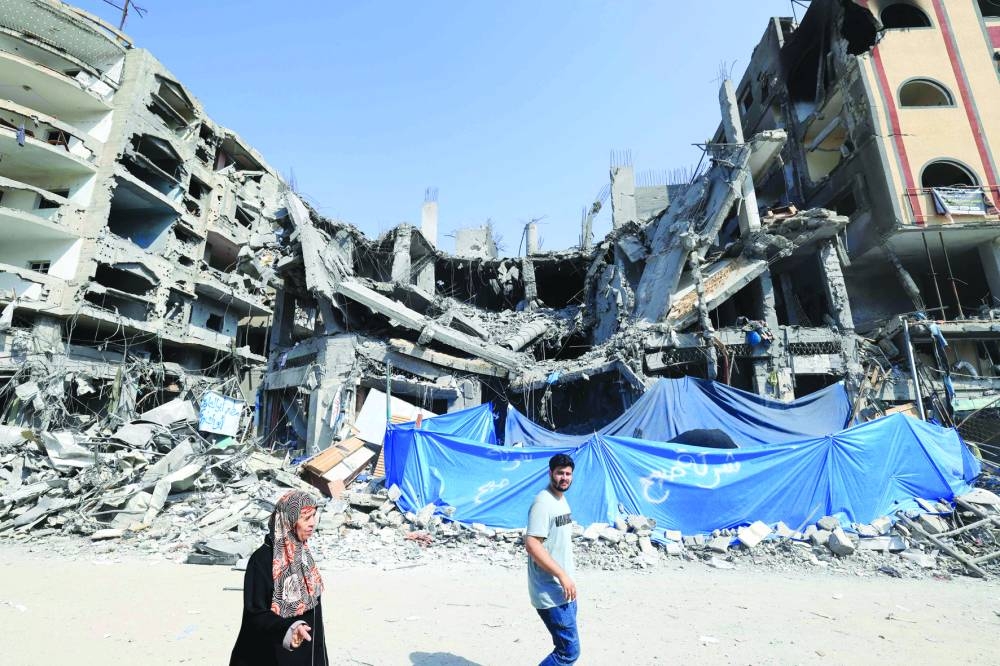The Palestinian health ministry said yesterday that Israeli air strikes had killed more than 700 Palestinians in Hamas-run Gaza overnight, and ministry spokesman Ashraf
al-Qidra said it was the highest 24-hour death toll in Israel’s two-week-old siege of the narrow strip.
UN agencies pleaded “on our knees” yesterday for emergency aid to be allowed unimpeded into Gaza, saying more than 20 times current deliveries were needed to support the Palestinian population after the two weeks of bombardment.
In a statement released on social media, the Palestinian health ministry said at least 5,791 Palestinians had been killed by Israeli bombardments since Oct 7, including 2,360 children. Some 704 were killed in the previous 24 hours alone, it said.
Reuters could not independently verify the ministry figures.
With international aid agencies warning of a humanitarian catastrophe unfolding in the tiny territory, one of the world’s most densely populated places, French President Emmanuel Macron flew to Israel.
Macron told Prime Minister Benjamin Netanyahu that France stood “shoulder to shoulder” with Israel in its war with Hamas but that it must not fight “without rules”.
HUMANITARIAN LAW VIOLATIONS CRITICISED
UN Secretary-General Antonio Guterres pleaded yesterday for civilians to be protected, voicing concern about “clear violations of international humanitarian law” in Gaza. The World Health Organisation, in the latest of increasingly desperate UN appeals, called for “an immediate humanitarian ceasefire” to allow safe deliveries of food, medicines and fuel.
Doctors in Gaza say patients arriving at hospitals are showing signs of disease caused by overcrowding and poor sanitation after more than 1.4mn people fled their homes for temporary shelters under Israel’s heaviest-ever bombardment.
FUEL SHORTAGE
All hospitals say they are running out of fuel to power their electricity generators, leaving them increasingly unable to treat the injured and ill. More than 40 medical centres have halted operations, a health ministry spokesman said.
The Israeli military reaffirmed it would not permit the entry of fuel to prevent Hamas from using it.
AID NOT DELIVERED
The UN said 20 trucks that had been due to deliver aid to Gaza via the Rafah crossing from Egypt yesterday had not entered the enclave. No reason was given, but the UN said it hoped the convoy would get into Gaza today.
After an air strike in Khan Younis in south Gaza, Abdallah Tabash held his dead daughter Sidra, refusing to let go as he held her bloodstained face and hair. “I want to look at her as much as I can,” he said.
Israeli tanks and troops are massed on the border between Israel and Gaza awaiting orders for an expected ground invasion. It is an operation that may be complicated by fears for the hostages’ welfare and by fighters heavily armed dug into a crowded urban setting using a vast network of tunnels.
Hamas on Monday freed two Israeli women who were among the more than 200 hostages taken during the rampage — the third and fourth to be released.
One of those freed, Yocheved Lifshitz, 85, said she was beaten by fighters as she was abducted and had difficulty breathing.
HOSTAGES TREATED WELL
Inside Gaza, a group of hostages were led into what Lifshitz called a “spider’s web” of damp tunnels and eventually reached a large hall where, under 24-hour guard, a doctor visited every other day and brought them medicines they needed.
“They treated us gently and met all our needs,” she said.
Qatari mediators are urging Hamas to quicken the pace of hostage releases to include more women and children and to do so without expecting Israeli concessions, according to three diplomats and a source in the region.
How soon Israel might launch a full-scale invasion of Gaza remains unclear. World powers are concerned the conflict could ignite the entire Middle East and some have urged Israel to exercise restraint, while affirming its right to self-defence.

Palestinians walk past a building damaged in an Israeli air strike in Khan Yunis on the southern Gaza Strip, yesterday.
